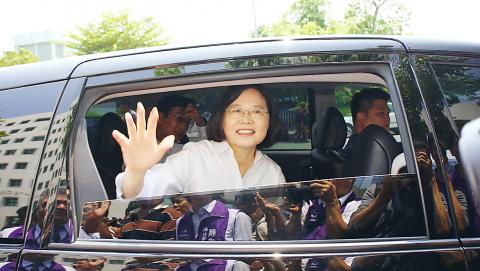Democratic Progressive Party (DPP) presidential candidate Tsai Ing-wen (蔡英文) yesterday criticized the Chinese Nationalist Party’s (KMT) economic policies, describing them as products of an “outdated mindset” that belong to the previous century.
“Taiwan’s economy is stuck in a rut; it is as if someone has hit the ‘pause’ button while watching TV,” Tsai said during a rally in Kaohsiung. “From a macroeconomic perspective, Taiwan failed to achieve even 1 percent GDP growth in the past quarter and the [average] salary is the same as that of 15 years ago. Oveseas relocation of the nation’s industries has also become a major issue; although businesses seem to be making money, the majority of investments, purchases, and employment do not benefit Taiwan anymore, as production facilities have been relocated overseas.”
She said the economy faces an even bigger challenge, as any economic growth that occurs is not equitably shared, and the gap between the rich and poor continues to widen.

Photo: CNA
The cause of the hiatus in growth and economic injustice is the KMT’s outdated mindset when it comes to formulating economic policy, she said.
“The KMT has come up with some policy ideas aimed at lifting the economy, but these proposals would only have worked in the past century, when global demand was strong, profits were high in the manufacturing industry and the export market was strong,” Tsai said. “However it is the 21st century now; the world has changed, but the KMT is still sticking to its antiquated ideas.”
Tsai said the KMT’s anachronistic approach to economic policymaking can be seen in its over-reliance on tax cuts and subsidies and their faith in economic liberalization.
“The fact is that the government does not know what to do, so it does nothing, and leaves everything to the market,” Tsai said. “And it blames the DPP for the problem, saying that the recession has been caused by our opposition to the cross-strait service trade agreement and the free economic pilot zones — do you think that is fair?”
The DPP believes that the key to economic growth is upgrading and transforming the industrial sector and a DPP government would implement policies to attract more investment, encourage businesses to innovate and make sure that the distribution of wealth is fair, she said.
Tsai said that if she is elected, she would invest the majority of the national defense budget into developing domestically produced military hardware and technology, which would encourage growth in related high-tech industries, adding that her proposal to develop domestically built submarines would benefit the ship-building industry in Kaohsiung.

An essay competition jointly organized by a local writing society and a publisher affiliated with the Chinese Communist Party (CCP) might have contravened the Act Governing Relations Between the People of the Taiwan Area and the Mainland Area (臺灣地區與大陸地區人民關係條例), the Mainland Affairs Council (MAC) said on Thursday. “In this case, the partner organization is clearly an agency under the CCP’s Fujian Provincial Committee,” MAC Deputy Minister and spokesperson Liang Wen-chieh (梁文傑) said at a news briefing in Taipei. “It also involves bringing Taiwanese students to China with all-expenses-paid arrangements to attend award ceremonies and camps,” Liang said. Those two “characteristics” are typically sufficient

The brilliant blue waters, thick foliage and bucolic atmosphere on this seemingly idyllic archipelago deep in the Pacific Ocean belie the key role it now plays in a titanic geopolitical struggle. Palau is again on the front line as China, and the US and its allies prepare their forces in an intensifying contest for control over the Asia-Pacific region. The democratic nation of just 17,000 people hosts US-controlled airstrips and soon-to-be-completed radar installations that the US military describes as “critical” to monitoring vast swathes of water and airspace. It is also a key piece of the second island chain, a string of

A magnitude 5.9 earthquake that struck about 33km off the coast of Hualien City was the "main shock" in a series of quakes in the area, with aftershocks expected over the next three days, the Central Weather Administration (CWA) said yesterday. Prior to the magnitude 5.9 quake shaking most of Taiwan at 6:53pm yesterday, six other earthquakes stronger than a magnitude of 4, starting with a magnitude 5.5 quake at 6:09pm, occurred in the area. CWA Seismological Center Director Wu Chien-fu (吳健富) confirmed that the quakes were all part of the same series and that the magnitude 5.5 temblor was

The Central Weather Administration has issued a heat alert for southeastern Taiwan, warning of temperatures as high as 36°C today, while alerting some coastal areas of strong winds later in the day. Kaohsiung’s Neimen District (內門) and Pingtung County’s Neipu Township (內埔) are under an orange heat alert, which warns of temperatures as high as 36°C for three consecutive days, the CWA said, citing southwest winds. The heat would also extend to Tainan’s Nansi (楠西) and Yujing (玉井) districts, as well as Pingtung’s Gaoshu (高樹), Yanpu (鹽埔) and Majia (瑪家) townships, it said, forecasting highs of up to 36°C in those areas